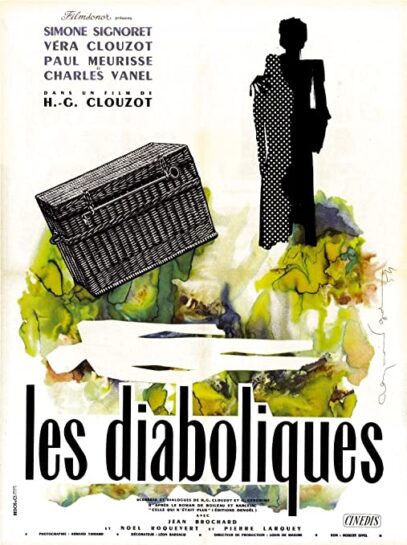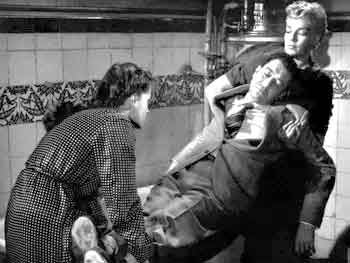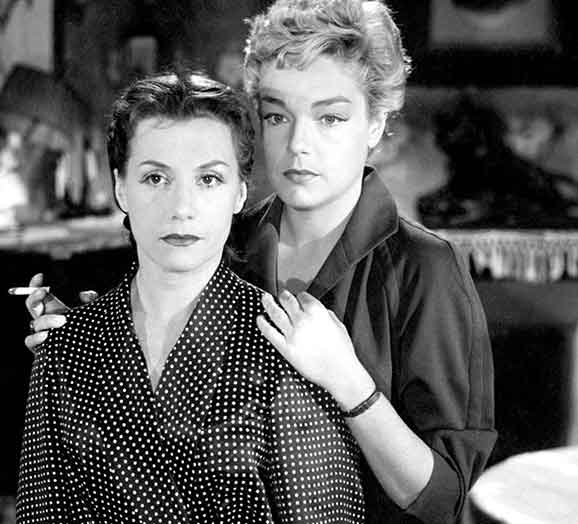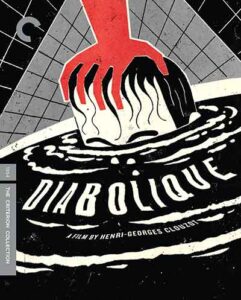 The most iconic film made by France’s Henri-Georges Clouzot (1907-1977), DIABOLIQUE/Les Diaboliques (1955) was the reason Clouzot was branded the “Gallic Hitchcock.” It followed THE WAGES OF FEAR/Le Salaire de la peur (1953), which despite having its US release trimmed by over 40 minutes was an international smash that demonstrated its maker’s relentless approach to suspense; as stated by a TIME magazine review, “Clouzot is not interested in tingling the customer’s spine, but rather in giving him the symptoms of a paralytic stroke.”
The most iconic film made by France’s Henri-Georges Clouzot (1907-1977), DIABOLIQUE/Les Diaboliques (1955) was the reason Clouzot was branded the “Gallic Hitchcock.” It followed THE WAGES OF FEAR/Le Salaire de la peur (1953), which despite having its US release trimmed by over 40 minutes was an international smash that demonstrated its maker’s relentless approach to suspense; as stated by a TIME magazine review, “Clouzot is not interested in tingling the customer’s spine, but rather in giving him the symptoms of a paralytic stroke.”
Adapted from the novel SHE WHO WAS NO MORE by Pierre Boileau and Thomas Narcejac (a property coveted by Hitchcock), DIABOLIQUE handily beat out the success of THE WAGES OF FEAR, due in no small part to a once-shocking twist ending. Recognizing that surprise was pivotal to his film’s success, Clouzot added a textual plea to the end credits that read (translated into English): “Don’t be diabolical yourself. Don’t spoil the ending for your friends by telling them what you’ve just seen. On their behalf—thank you!”
DIABOLIQUE’s US release was handled by United Motion Picture Organization, which initially opened it at NYC’s Fine Arts Theater, where patrons were forced to sign a contract swearing not to give away the ending and forbidden to enter the theater after the film started (gimmicks that were mimicked for PSYCHO’s release). The film, which reportedly caused fainting in theaters, broke out of the arthouse ghetto, earning a reported $1 million at the box office (a mighty impressive sum in 1955). The ensuing decades have offered up numerous imitations of DIABOLIQUE (such as Curtis Harrington’s 1967 GAMES) and one overt remake (in a 1996 Sharon Stone headlined disaster), but the material’s original 1955 form remains its most potent.
The setting is a boarding school, contained in an ancient chateau with a slime-ridden swimming pool—a setting that comes to thematically reflect the events of the narrative quite accurately. Christina Delasalle (Véra Clouzot), the school’s owner, is afflicted by heart problems, and trapped in an abusive relationship with her husband Michel (Paul Meurisse), who happens to be the school principal. The latter’s mistress Nicole Horner (Simone Signoret), who teaches at the school, has a friendship with Christina based, it would seem, on their mutual distrust of Michel.
Nicole hatches a scheme to kill Michel and hide his body, to which Christina, after being brutalized one too many times, agrees. The scheme, which commences in Nicole’s apartment, involves Michel being administered a sedative, immersed in a bathtub, driven to the school in the back of an old car and deposited at the bottom of the filthy swimming pool, with the expectation that the corpse will float to the top and make people suspect an accidental drowning. But the expected appearance never occurs, leading Christina to have the pool drained, which reveals that Michel’s corpse is MIA.
Enter Inspector Alfred Fichet (Charles Vanel), a retired cop turned private detective, who takes an interest in the case. As the weirdness mounts, with a student at the school claiming he was recently reprimanded by Michel and the latter’s features seeming to appear in a school photograph, Christina’s cardiac issues mount. She eventually breaks down and tells Fichet everything, but doing so doesn’t halt the strangeness, or the fact that she’s dangerously close to having a full blown heart attack.
Onto the twist ending, which isn’t nearly as surprising as it once seemed (not least because it’s been so widely imitated). The pacing is also downright glacial by modern standards, although the film remains furiously compelling. The suspense is constructed with unself-conscious skill, aided by gritty black and white photography that enhances the atmosphere of morbidity and decay.
So the filmmaking can’t be faulted, although the script can. It’s a bit overly gimmicky, setting up so many fake scares (a drunken soldier searching the car where Michel’s body is stashed, a janitor sticking a rake into the pool where the corpse was submerged, etc.) that the viewer quickly becomes acclimated to them.
The acting is a bit uneven, with the director’s spouse Véra Clouzot (1913-1960), for whom the source novel’s narrative was heavily retooled, proving quite effective as Christina. Simone Signoret lends strong (if unexceptional) support as Nicole, with the role having been deliberately played down (in terms of lighting and screen time) by Clouzot, who was anxious to give his better half as much exposure as possible. Véra Clouzot, incidentally, only acted in two other films (both directed by her husband), and five years after the release of DIALBOLIQUE was felled, like the unfortunate Christina, by a heart attack.
Vital Statistics
DIABOLIQUE (LES DIABOLIQUES)
Filmsonor/Vera Films
Director/Producer: Henri-Georges Clouzot
Screenplay: Henri-Georges Clouzot, Jérôme Géronimi
(Based on a novel by Pierre Boileau, Thomas Narcejac)
Cinematography: Armand Thirard
Editing: Madeleine Gug
Cast: Véra Clouzot, Simone Signoret, Paul Meurisse, Charles Vanel, Jean Brochard, Thérèse Dorny, Michel Serrault, Georges Chamarat, Robert Dalban, Camille Guerini, Jacques Hilling, Jean Lefebvre, Aminda Montserrat, Jean Temerson, Jacques Varennes, Georges Poujouly, Yves-Marie Maurin, Noël Roquevert, Pierre Larquey



